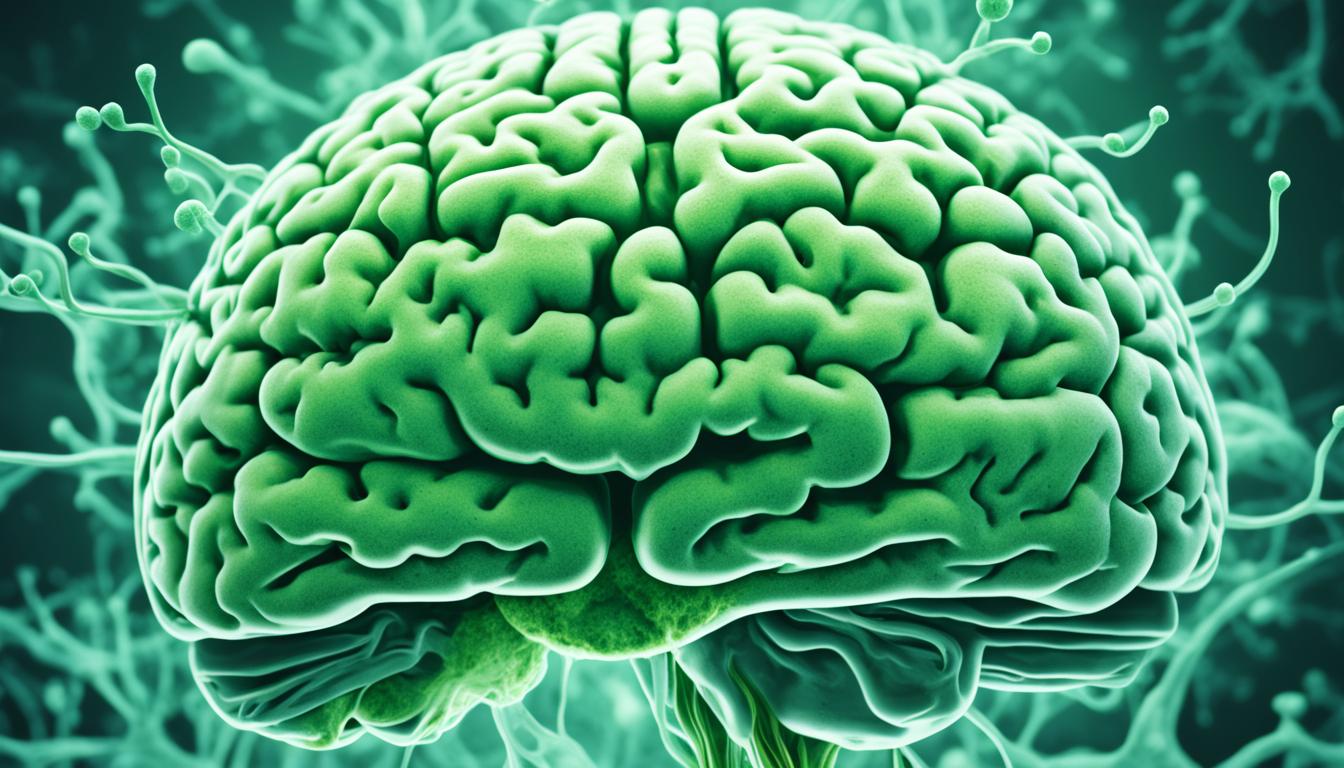
Neurological Symptoms of Mold Exposure Risks
In this section, we will explore the risks associated with neurological symptoms that can arise from exposure to mold. Mold exposure has been linked to various neurological issues, causing concerns for brain health and cognitive function. Understanding the impact of mold on the nervous system is crucial for identifying and managing these potential risks.
Key Takeaways:
- Exposure to mold can lead to neurological symptoms that affect brain health and cognitive function.
- Mold toxins can negatively impact the nervous system and cause nerve damage.
- The most common neurological symptoms of mold exposure include brain fog, memory problems, headaches, and dizziness.
- Mold exposure has been associated with cognitive disorders, such as impaired memory and difficulty concentrating.
- It is important to seek medical evaluation and treatment if you suspect your symptoms are mold-related.
Understanding Mold Exposure and Its Effects
When it comes to mold exposure, the impact on neurological health cannot be underestimated. Mold toxins have the potential to affect the nervous system, leading to nerve damage and a range of neurological symptoms. Understanding the connection between mold exposure and its effects is crucial for safeguarding your overall well-being.
Mold toxins, also known as mycotoxins, can have detrimental effects on neurological health. These toxins are produced by various types of molds, including Stachybotrys chartarum (black mold), Aspergillus, Penicillium, and Cladosporium. When inhaled or ingested, mold toxins can enter the bloodstream and travel to the brain, where they can cause damage to nerve cells.
The nerve damage resulting from mold exposure can manifest in various neurological symptoms. These symptoms may include headaches, dizziness, difficulty concentrating, memory problems, mood swings, and sleep disturbances. Additionally, individuals may experience sensory issues like tingling or numbness in the extremities, muscle weakness, and coordination problems.
Research has shown that mold exposure and nerve damage can also contribute to the development of more serious neurological conditions. Studies have linked mold exposure to conditions such as multiple sclerosis, Parkinson’s disease, and neurodegenerative disorders.
To better understand the impact of mold exposure on neurological health, it is essential to consider the mechanisms through which mold toxins affect the nervous system. Mold toxins can cause inflammation in the brain, disrupt neurotransmitter function, and impair the integrity of the blood-brain barrier. These processes can lead to neuroinflammation and oxidative stress, further contributing to nerve damage and neurological symptoms.
It is important to note that individuals vary in their susceptibility to mold toxins, and the severity of neurological symptoms can also depend on the duration and intensity of exposure. Some people may develop symptoms after a short-term exposure, while others may experience more significant effects over a prolonged period.
In the next section, we will explore the most common neurological symptoms associated with mold exposure in more detail. Understanding these symptoms is crucial for early detection and seeking appropriate medical evaluation and treatment.
Common Neurological Symptoms of Mold Exposure
Exposure to mold can have a range of neurological consequences, affecting the brain and resulting in various symptoms. Here, we will discuss the most common neurological symptoms that individuals may experience as a result of mold exposure.
Brain Fog
One of the most frequently reported mold-induced brain symptoms is brain fog. This is characterized by cognitive difficulties, including poor concentration, memory problems, and a feeling of mental haziness.
Headaches
Headaches can also be a prevalent neurological symptom caused by mold exposure. These headaches may vary in intensity and duration, ranging from mild and intermittent to severe and chronic.
Dizziness
Dizziness and vertigo are common complaints among individuals exposed to mold. These symptoms can disrupt balance and coordination, leading to difficulties in everyday activities.
Mood and Behavioral Changes
Mold exposure can impact mood and behavior, contributing to irritability, anxiety, depression, and even aggression. Changes in personality and emotional stability may also be observed.
Visual and Hearing Impairment
In some cases, mold exposure can result in vision and hearing impairments. Blurred vision, sensitivity to light, and ringing in the ears are a few examples of neurological symptoms that can affect sensory perception.
Other Cognitive and Behavioral Changes
Other mold-induced brain symptoms may include difficulty finding words, disorientation, slowed reaction time, and reduced problem-solving abilities. These cognitive impairments can significantly impact daily functioning and overall quality of life.
If you are experiencing any of these neurological symptoms, it is crucial to consider mold exposure as a potential cause. Seeking medical evaluation and addressing mold-related issues promptly can help mitigate the neurological consequences and improve your overall well-being.
Remember, early identification and intervention are key to managing and preventing further neurological symptoms associated with mold exposure.

The Link Between Mold Exposure and Cognitive Function
Exposure to mold can have profound effects on cognitive function, impacting various aspects of brain health. Mold toxicity has been linked to the development of neurological disorders, leading to impaired memory, difficulty concentrating, and reduced cognitive abilities.
Research has shown that mold exposure can trigger inflammation in the brain, disrupting normal neurological processes and causing cognitive dysfunction. The toxins produced by certain types of mold can directly damage neurons and hinder the transmission of signals, further contributing to cognitive impairment.
One study published in the Journal of Occupational and Environmental Medicine found that individuals exposed to mold in indoor environments experienced significant declines in cognitive function, including memory, attention, and processing speed. These cognitive deficits were observed even in individuals with no prior history of neurological issues.
Furthermore, prolonged exposure to mold toxins can lead to the development of neurological disorders such as mold-induced encephalopathy. This condition is characterized by persistent cognitive impairment, mood changes, and neurological symptoms that can significantly impact an individual’s day-to-day functioning.
In addition to the direct effects on cognitive function, mold exposure can also exacerbate or contribute to existing neurological conditions. For individuals with pre-existing conditions such as multiple sclerosis or Alzheimer’s disease, mold toxicity can worsen their cognitive symptoms and overall prognosis.
To better understand the relationship between mold exposure and cognitive function, further research is needed. However, the existing evidence highlights the importance of addressing mold issues promptly to protect brain health and prevent the onset or progression of neurological disorders.

It is crucial to seek professional assistance for mold evaluation and remediation if you suspect mold in your home or workplace. Taking proactive measures to prevent mold growth, such as controlling moisture levels and improving ventilation, is essential for maintaining cognitive function and overall well-being.
Neurological Symptoms Associated with Mold Toxicity
Below is a table summarizing the neurological symptoms commonly reported in individuals exposed to mold:
| Neurological Symptoms |
|---|
| Memory problems |
| Difficulty concentrating |
| Brain fog |
| Confusion |
| Headaches |
| Dizziness |
| Mood swings |
| Anxiety |
| Depression |
| Impaired judgment |
| Personality changes |
| Difficulty finding words |
| Impaired coordination |
| Tremors |
If you are experiencing any of these symptoms and suspect mold exposure, it is advisable to consult with a healthcare professional familiar with the cognitive effects of mold toxicity. They can help diagnose and manage your symptoms, as well as provide guidance on reducing your exposure to mold in the future.
Remember, safeguarding your brain health is crucial for maintaining overall well-being. Addressing mold-related issues promptly and taking proactive measures can go a long way in protecting your cognitive function and preventing the development of neurological disorders.
Identifying Mold-Related Neurological Symptoms
If you suspect that you may be experiencing neurological symptoms as a result of mold exposure, it is essential to identify and distinguish these symptoms from other potential causes. This section will provide you with valuable insights and guidance to help you recognize mold-related neurological symptoms effectively.
Differentiating between Typical Brain Fog and Brain Fog from Mold Exposure
One of the most common neurological symptoms associated with mold exposure is brain fog. However, it is crucial to differentiate between typical brain fog, which can occur due to various factors, and brain fog specifically caused by mold exposure. By understanding the distinguishing characteristics, you can identify when your brain fog may be mold-related.
When experiencing brain fog from mold exposure, you may notice a persistent feeling of mental confusion, difficulty concentrating, impaired memory, and reduced cognitive abilities. This brain fog may worsen when you enter a moldy environment or come into contact with mold spores. It is often accompanied by other neurological symptoms, such as headaches, dizziness, and changes in behavior.
If you experience brain fog that is persistent, significantly affects your daily functioning, and is accompanied by other neurological symptoms, it is important to consider the possibility of mold exposure as the underlying cause.
Recognizing Other Mold-Related Neurological Symptoms
In addition to brain fog, mold exposure can contribute to a range of other neurological symptoms. These may include frequent headaches, migraines, dizziness, vertigo, fatigue, tremors, irritability, mood swings, anxiety, depression, and changes in sensory perception. If you are experiencing any combination of these symptoms and suspect mold exposure, it is crucial to investigate further.
It is important to note that everyone’s response to mold exposure can be different. While some individuals may experience severe neurological symptoms, others may have milder or no symptoms at all. Therefore, it is essential to pay attention to any changes in your health and well-being and consult with a medical professional if you have concerns.
By being aware of the mold-related neurological symptoms and understanding how they differ from typical brain fog, you can take proactive steps to address the issue and protect your health.
Next Steps: Seeking Medical Evaluation
If you suspect that your neurological symptoms are mold-related, it is crucial to seek medical evaluation from a healthcare professional experienced in mold-related illnesses. They can conduct a thorough assessment, evaluate your symptoms, and determine whether mold exposure is a contributing factor.
Remember, early detection and intervention can play a significant role in preventing further damage and improving your overall well-being. If you have any concerns regarding mold exposure and its potential neurological effects, consult with a healthcare professional as soon as possible.
Seeking Medical Evaluation and Treatment
If you suspect that you are experiencing neurological symptoms of mold exposure, it is crucial to seek medical evaluation and treatment. Consulting with healthcare professionals who specialize in mold-related brain issues can help identify the root cause of your symptoms and provide appropriate care.
When searching for a healthcare provider, look for experts who are knowledgeable about neurological symptoms of mold exposure. They should be experienced in diagnosing and treating mold-related brain issues to ensure accurate assessment and effective treatment.
During the medical evaluation, your healthcare provider may perform various tests to assess your neurological function and determine if mold exposure is the underlying cause. These may include:
- Neurological examinations: Assessing your reflexes, muscle strength, coordination, and sensory function to evaluate the impact of mold on your nervous system.
- Neuropsychological testing: Evaluating cognitive function, memory, attention, and other mental abilities affected by mold-related brain issues.
- Imaging studies: Utilizing brain imaging techniques such as MRI or CT scans to detect any structural changes or abnormalities.
- Lab tests: Analyzing blood or urine samples to identify markers of mold toxins or other relevant factors.
“Early detection and diagnosis are crucial in managing neurological symptoms of mold exposure. Seeking the appropriate medical evaluation can guide treatment decisions and improve your overall health and well-being.”
Treatment options for mold-related brain issues may vary depending on the severity of your symptoms and individual circumstances. Some potential approaches that healthcare professionals may recommend include:
- Environmental remediation: Addressing the mold issue in your living or working environment to prevent further exposure to mold toxins.
- Medication: Prescribing medications to alleviate symptoms and manage any associated conditions, such as anti-inflammatory drugs or antifungal medications.
- Therapies: Recommending therapies such as cognitive rehabilitation, physical therapy, or counseling to address specific neurological symptoms and enhance overall well-being.
- Lifestyle modifications: Providing guidance on lifestyle changes and healthy habits that can support neurological health, such as stress reduction techniques, regular exercise, and a balanced diet.
Remember, always consult with a healthcare professional for an accurate diagnosis and personalized treatment plan. Each individual’s situation is unique, and a healthcare provider can offer tailored guidance based on your specific needs. By taking the necessary steps to seek medical evaluation and treatment, you can optimize your chances of managing and improving neurological symptoms associated with mold exposure.
Preventing Mold Exposure and Safeguarding Your Health
Preventing mold exposure is crucial for maintaining your cognitive and nerve health. By implementing the following tips and strategies, you can create a safe environment and minimize the risk of mold-related brain issues and neurological symptoms.
- Regular Inspections: Conduct routine inspections of your home or workplace to identify any signs of mold growth. Focus on areas prone to moisture, such as bathrooms, basements, and kitchens.
- Moisture Control: Keep moisture levels in check to prevent mold growth. Fix any leaks or water intrusions promptly, ensure proper ventilation in areas prone to humidity, and use dehumidifiers if necessary.
- Proper Ventilation: Proper airflow is vital in preventing mold growth. Ensure that your home or workplace has adequate ventilation systems, especially in areas like bathrooms, laundry rooms, and kitchens.
Remember, prevention is key when it comes to avoiding neurological symptoms of mold exposure. Taking proactive measures such as regular inspections, moisture control, and proper ventilation can significantly reduce the risk of mold-related brain issues. By prioritizing the health of your environment, you safeguard your own well-being.
“Prevention is key when it comes to avoiding mold-related brain issues and neurological symptoms. By taking proactive measures such as regular inspections, moisture control, and proper ventilation, you can safeguard your cognitive and nerve health.” – Dr. Rebecca Johnson
Remember, education and awareness are crucial in preventing mold-related health issues. By following our recommendations and implementing preventive measures, you can protect yourself and your loved ones from the potential dangers of mold exposure.
Conclusion
In conclusion, exposure to mold can have significant implications for neurological health. The presence of mold in your environment can lead to a wide range of symptoms, including cognitive issues and other neurological disorders.
By understanding the risks associated with mold exposure, you can take proactive steps to protect your cognitive and nerve function. It is crucial to identify and address any neurological symptoms that may arise from mold exposure.
Seeking medical evaluation and treatment from professionals experienced in mold-related health issues is essential. They can provide accurate diagnosis and recommend appropriate treatment options to address the neurological consequences of mold exposure.
Prevention is key to safeguarding your health. Regular inspections, moisture control, and proper ventilation are effective measures in minimizing the impact of mold on your cognitive and nerve function. By taking these preventive actions, you can reduce the risk of mold-related neurological symptoms and maintain a healthy living environment.
Contact Fix Mold Miami at 305-465-6653 for reliable mold assessments, prevention, and remediation services in Florida. Their expertise will ensure you receive the highest-rated assistance in mitigating mold-related risks and protecting your neurological well-being.




